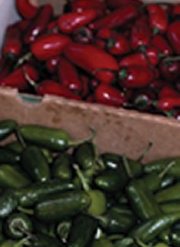Hot-pepper ingredient slows cancer in mice
From Washington, D.C., at a meeting of the American Association for Cancer Research

Capsaicin, the compound that gives hot chili peppers their zip, kills cancer cells in a test tube and slows the growth of pancreatic and prostate cancers in mice, two studies show.
A University of Pittsburgh Medical School team led by biochemist Sanjay K. Srivastava implanted pancreatic tumor cells from people into mice. The same day, some of the mice began receiving oral doses of capsaicin while the others got saline solution.
After 38 days, tumors in the capsaicin group were half the size of the tumors in the mice getting saline.
Although spicy, the capsaicin didn’t cause any gastrointestinal problems, says Srivastava.
In a similar study, researchers at Cedars-Sinai Medical Center and the University of California, Los Angeles implanted human prostate-tumor tissue in mice. Some of the animals subsequently received capsaicin orally while others didn’t. After 4 weeks, the tumors in mice getting the capsaicin were only one-fourth the size of tumors in the other mice, the scientists report in the March 15 Cancer Research.
The findings are provocative because this particular prostate cancer came from “quite an aggressive cell line,” says study coauthor James O’Kelly, a pathologist. “But we’re not advocating that people start eating a lot of hot peppers to treat their prostate cancer,” he says.
Both teams of researchers became interested in capsaicin after Japanese researchers reported 5 years ago that the compound killed leukemia cells in test tubes. Similar lab tests by Srivastava’s group indicate that capsaicin induces suicide by tumor cells, while O’Kelly and his colleagues found signs that the compound stifled cell proliferation in some tests and induced cell suicide in others.







